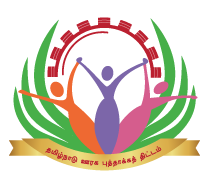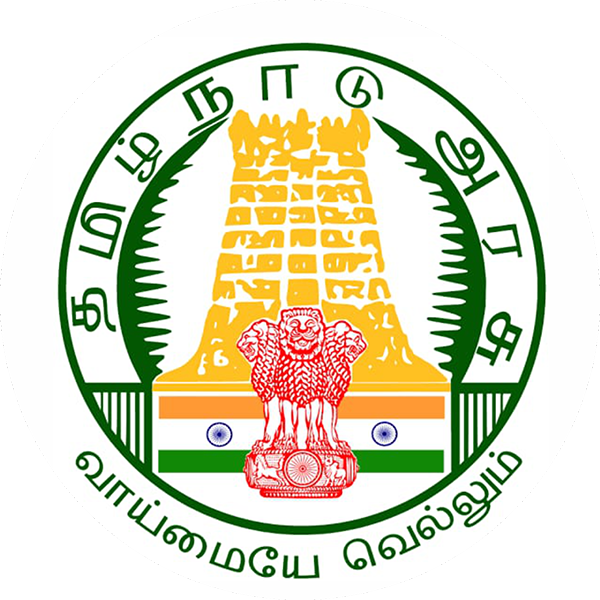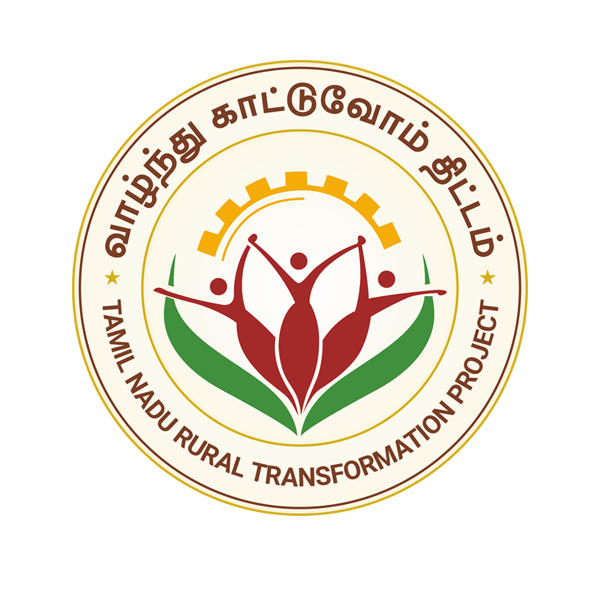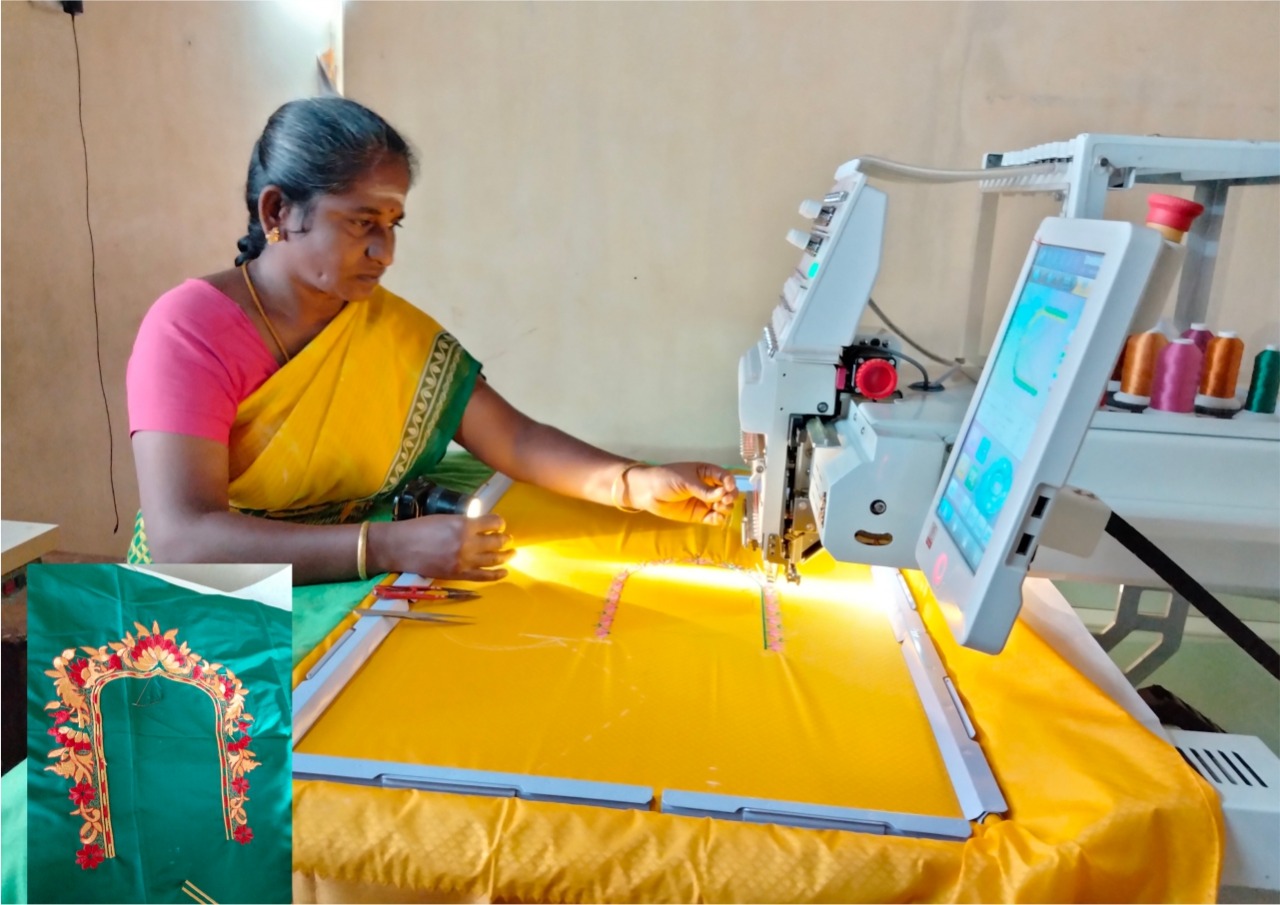Tamil Nadu Rural Transformation Project (TNRTP)
Rural Development & Panchayat Raj
Government Of Tamil Nadu





Aiding rural, household economy through governmental interventions is a less spoken success story. Mrs Shanthi’s journey to becoming a successful entrepreneur is a case in point.
Shanthi was born to an agricultural family in Melamathur panchayat, Madurai. She obtained education till the 10th grade, after which her father did not educate her, due to age old traditions. Getting a girl child educated in Madurai, a city once known for pervasive female infanticide, was in itself is an arduous feat.
‘I was the first person in my village to move out and complete SSLC’ Shanthi emphasizes with a smile while mentioning her education. My father, due to very various reasons refused to get me educated beyond 10th. But he regretted his decision after seeing me grow as a successful entrepreneur.
Ever since her school days, Shanthi fantasized about being a tailor and running her own garment shop. ‘I used to wait for the craft period in my school days. Crafts and tailoring which started as a childhood hobby turned out to be a livelihood for me’ she said
After dropping out of school, Shanthi bought an old sewing machine to make ends meet. Initially, she used to stitch blouses and would earn about Rs.50 per piece.
Shanthi was married to Nagaraj in the year 2009. Meanwhile, her passion for tailoring and embroidery crafts has grown with the years passing. The biggest turnaround in Shanthi’s life happened when she registered herself with the Roja self-help group (SHG) in 2010. Being a part of the SHG helped Shanthi learn about the organisational process and the financial assistance available. She maintained the SHG bank account and looked after its financial transactions.
In the year 2016, Shanthi secured a mudra loan of Rs.45,000. With thisloan and her savings money, Shanthi bought an advanced sewing machine which boosted her business. ‘My family, especially my husband, was the major support behind me. My husband encouraged me to secure government loans and expand my business’ shared Shanthi.
She further added, ‘Advanced sewing machine helped speed up my stitching process. In turn, I was able to get more orders and increase my revenue. I repaid my mudra loan six months before the due date.’
Hit by Covid:
With the onset of the Covid-19 pandemic in the year 2020, every business came to a standstill, the SHG being the most affected. Since businesses were shut down, Shanthi was unable to get new orders and was devoid of resources to finance her business.
During this difficult time, Shanthi came to know about the Tamil Nadu Government’s Vaazhndhu Kaatuvom Project – VKP (formerly known as Tamil Nadu Rural Transformation Project) and the financial assistance available to distressed businesses. She applied for a loan and got Rs.30,000 as a temporary relief. Adding Rs.20,000 from her savings Shanthi repaired her machine and bought raw materials.
As a blessing in disguise, since people were not able to move out due to covid restrictions, Shanthi stitched and took the products by herself to sell them locally. It was a huge success as she was able to sell her products and get herself acquainted with the locality.
‘People were willing to place more orders at the same time I was eager to expand my business. I repaid this loan in advance as well. Over the course of time, I was more interested in blouse design, patchwork, embroidery and aari work. But for that, I needed a more advanced machine and training to do computer embroideries.
Governmental intervention as a catalyst
Governmental intervention is a catalyst in improving any sector. Shanthi’s case is one among many such successful interventions. The government’s financial support came to her aid at the right time, to start her business and revive it when faced with financial adversity.
Shanthi took part in the convergence campaign organised by the VKP in the year 2021. With VKP support and guidance she applied for a loan with District Industries Centre (DIC). A loan amount of Rs.4,71,000 was approved with 25% of the sum as a government subsidy, citing her credentials and good track record in repaying the loan.
‘Government’s financial assistance has been the backbone of my growth. VKP staff support and guidance at every level instilled confidence in me’ adds Shanthi.
“Truth is my only collateral” – Shanthi
‘During covid-19 lockdown my husband also lost his job. So we were completely dependent on my business. I approached the bank and told the truth about my financial situation. My loan was approved. I believe in myself and in my business. I’m confident of repaying this loan before the due date as well. With the DIC loan, I bought modern equipment, software and several inbuilt embroidery designs. Now I am earning from Rs.1000 to Rs.5000 per blouse depending on the pattern. And I can earn up to Rs.4000 per day on regular orders’ adds Shanthi.
Willing to train budding entrepreneurs
She further emphasized that ‘The training for computerised embroidery alone costs Rs.20,000 for two days. Now I can handle the software by myself. I’m planning to stitch and sell more customised blouses, silk skirts and churidars and establish my own garments.
‘I’m willing to train my fellow SHG members, who can buy a computerised embroidery machine. I will be able to provide customised blouses at a much lesser rate than readymade blouses available on the market’, Shanthi ends with confidence.
Shanthi’s journey from an SHG member to a successful entrepreneur is made possible due to her grit, determination and resilience in the face of adversity.
Tags :